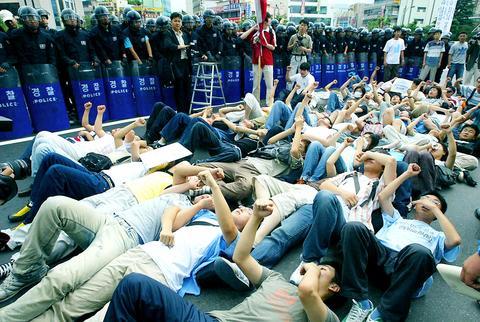North and South Korea, the US, Japan, Russia and China began working-level talks yesterday to lay the foundation for a third round of the complex discussions on the North Korean nuclear crisis.
Officials from several parties involved have cautioned that scant progress can be expected at the third round of senior-level talks to be held in Beijing from Wednesday to Saturday to try to end a 20-month standoff between Washington and Pyongyang over North Korea's nuclear ambitions.

PHOTO: AP
Chinese Foreign Minister Li Zhaoxing (
Asked if he expected more progress than at the previous two rounds, Li said: "Yes."
"I hope we will make progress. We hope the peninsula will be nuclear free and enjoy peace and stability," Li told reporters on the sidelines of an Asian diplomatic forum in the eastern Chinese port of Qingdao.
The talks should be held in a "pragmatic, relaxed atmosphere," he said.
The crisis erupted in October 2002, when US officials said North Korea had disclosed it was working on a secret program to enrich uranium for weapons, in violation of an international agreement.
North Korea denies it had a uranium enrichment program, but early last year it threw out UN nuclear inspectors, withdrew from the nuclear Non-Proliferation Treaty (NPT) and restarted a mothballed nuclear reactor from which weapons-grade plutonium can be extracted.
"Various parties' political willingness, diplomatic wisdom, patience in negotiations and ability to compromise will go through a rigorous test," the People's Daily, the mouthpiece of China's Communist Party, said in a commentary at the start of the two days of working talks.
"Historical grievances that have piled up, conflict of practical interests, different security strategies in addition to the US elections have decided that a fundamental resolution to the Korean peninsula nuclear issue will be a long and difficult process, and reversals may even appear," the newspaper said.
China has said expectations should not be too high from these talks, and many analysts have said North Korea may be waiting for the outcome of the US presidential elections in November before deciding whether to take part in serious bargaining.
China, one of the few friends of isolated communist North Korea, has said that what it called Pyong-yang's reasonable demands should be given emphasis and resolved.
The US side is demanding the complete, verifiable and irreversible dismantling of North Korea's nuclear programs.
North Korea said yesterday the US was chiefly to blame for the standoff.
"It is the US which reneged on its international obligation and wantonly violated the NPT," the North's KCNA news agency said, quoting the Rodong Sinmun newspaper.
"For a fair solution to the nuclear issue between the DPRK and the US the countries concerned should demand the US drop at once its hostile policy toward the DPRK," it said.
DPRK, the Democratic People's Republic of Korea, is the official name for North Korea.
Japanese media said on Saturday that Tokyo would offer energy assistance to North Korea, in need of aid for its struggling economy, at the talks but only if the communist state freezes its nuclear programs.

VAGUE: The criteria of the amnesty remain unclear, but it would cover political violence from 1999 to today, and those convicted of murder or drug trafficking would not qualify Venezuelan Acting President Delcy Rodriguez on Friday announced an amnesty bill that could lead to the release of hundreds of prisoners, including opposition leaders, journalists and human rights activists detained for political reasons. The measure had long been sought by the US-backed opposition. It is the latest concession Rodriguez has made since taking the reins of the country on Jan. 3 after the brazen seizure of then-Venezuelan president Nicolas Maduro. Rodriguez told a gathering of justices, magistrates, ministers, military brass and other government leaders that the ruling party-controlled Venezuelan National Assembly would take up the bill with urgency. Rodriguez also announced the shutdown

Civil society leaders and members of a left-wing coalition yesterday filed impeachment complaints against Philippine Vice President Sara Duterte, restarting a process sidelined by the Supreme Court last year. Both cases accuse Duterte of misusing public funds during her term as education secretary, while one revives allegations that she threatened to assassinate former ally Philippine President Ferdinand Marcos Jr. The filings come on the same day that a committee in the House of Representatives was to begin hearings into impeachment complaints against Marcos, accused of corruption tied to a spiraling scandal over bogus flood control projects. Under the constitution, an impeachment by the

China executed 11 people linked to Myanmar criminal gangs, including “key members” of telecom scam operations, state media reported yesterday, as Beijing toughens its response to the sprawling, transnational industry. Fraud compounds where scammers lure Internet users into fake romantic relationships and cryptocurrency investments have flourished across Southeast Asia, including in Myanmar. Initially largely targeting Chinese speakers, the criminal groups behind the compounds have expanded operations into multiple languages to steal from victims around the world. Those conducting the scams are sometimes willing con artists, and other times trafficked foreign nationals forced to work. In the past few years, Beijing has stepped up cooperation

Exiled Tibetans began a unique global election yesterday for a government representing a homeland many have never seen, as part of a democratic exercise voters say carries great weight. From red-robed Buddhist monks in the snowy Himalayas, to political exiles in megacities across South Asia, to refugees in Australia, Europe and North America, voting takes place in 27 countries — but not China. “Elections ... show that the struggle for Tibet’s freedom and independence continues from generation to generation,” said candidate Gyaltsen Chokye, 33, who is based in the Indian hill-town of Dharamsala, headquarters of the government-in-exile, the Central Tibetan Administration (CTA). It